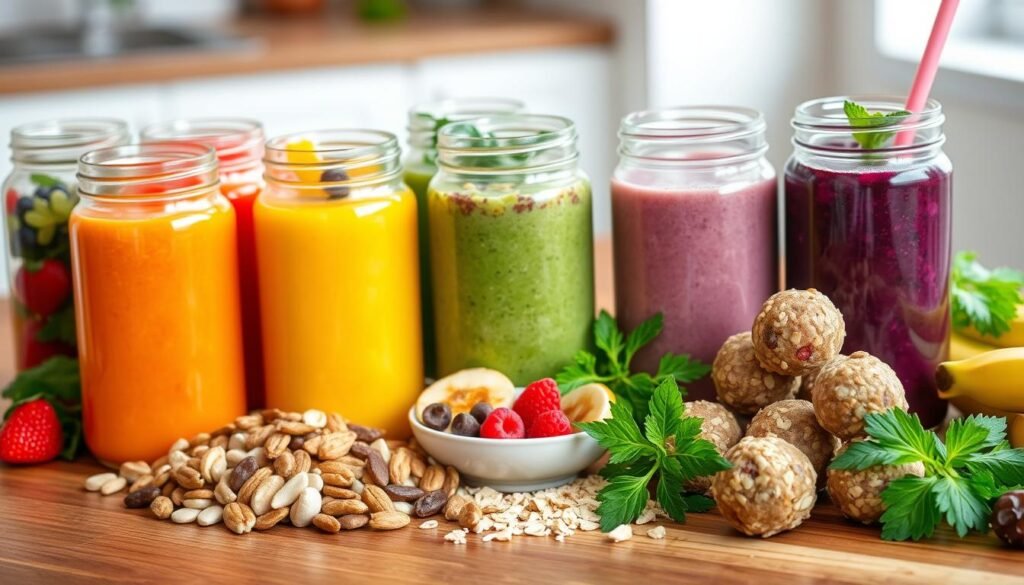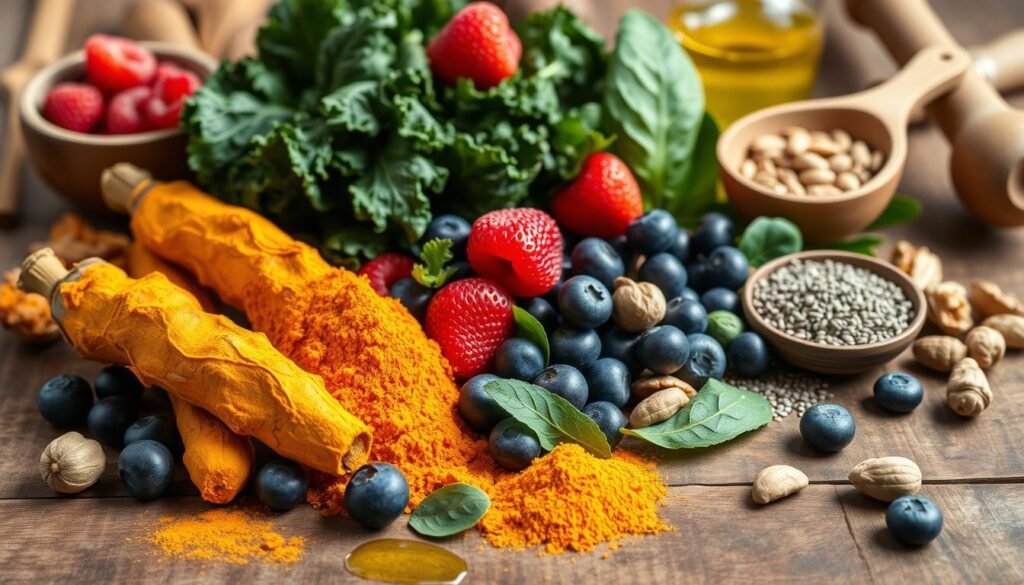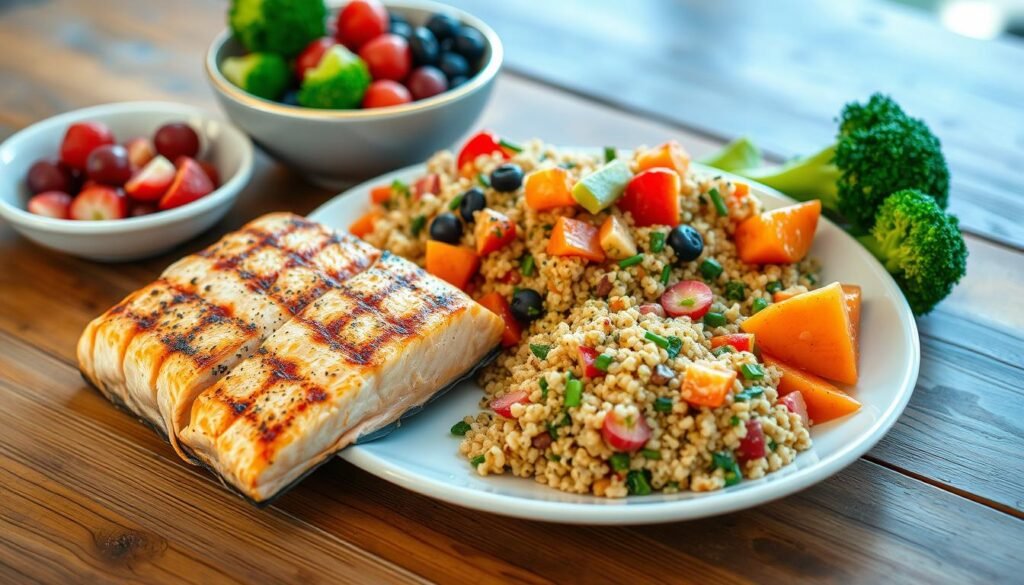Did you know that a diet with 3,000 calories daily is vital for people with lung cancer? It helps them keep their weight up during treatment. Having a carefully planned menu is key in aiding recovery. Proper nutrition boosts energy, enhances treatment results, and supports healing.
Using nutritional therapy through healthy recipes is a big boost for patient health. High-calorie items like whole milk, peanut butter, and red meat are crucial. Smaller, more frequent meals and adding in high-calorie extras like butter and cheese help too.
It’s vital to eat foods rich in nutrients to fight treatment side effects and improve health. Looking at healthy recipes made for lung cancer patients can offer great meal ideas. These meals are both soothing and nutritious.
Key Takeaways
- A lung cancer diet menu can include up to 3,000 calories daily to help maintain weight.
- High-calorie foods like dried fruits and grape juice are encouraged to aid weight maintenance.
- Patients should aim for approximately 20 grams of protein per meal.
- Five servings of fruits and vegetables are recommended each day.
- Small, frequent meals throughout the day can help manage appetite loss.
- Keep hydrated with at least 64 ounces of decaffeinated fluids daily.
Understanding the Importance of Diet During Lung Cancer Treatment
Diet is key when fighting lung cancer. A good cancer treatment diet helps keep strength up, improves how well treatment works, and boosts the immune system. Though no diet can cure lung cancer, eating right makes a big difference in your fight.
The Role of Nutrition in Recovery
For those going through lung cancer treatment, eating well is crucial. Good nutrition helps manage changes in appetite and weight. With treatments causing side effects like nausea and tiredness, it’s important to eat foods that help you stay strong and recover. Eating plant-based proteins, healthy fats, and whole grains is especially beneficial.
Managing Treatment Side Effects Through Diet
Dealing with side effects can make life better during lung cancer treatment. Changing what you eat can ease issues like constipation and losing your appetite. Key approaches are:
- Eating little and often to help when you’re not hungry.
- Drinking plenty of fluids to avoid constipation.
- Choosing foods that are good for diarrhea.
- Trying strong flavors to make food taste better.
- Using foods like citrus and ginger to fight nausea.
Avoiding processed foods is a must since they can hurt your immune system and make symptoms worse. Diet experts can create a eating plan just for you, meeting your needs and likes.
| Side Effect | Recommended Dietary Approach |
|---|---|
| Nausea | Consume ginger, peppermint, and small, bland meals. |
| Diarrhea | Incorporate sodium and potassium-rich foods. |
| Constipation | Stay hydrated and eat fiber-rich foods. |
| Loss of Appetite | Focus on nutrient-dense, small meals. |
| Taste Changes | Experiment with strong flavors. |
Using these tips not only helps with side effects but also promotes a healthier diet during lung cancer treatment. This approach boosts your health and supports recovery.
Lung Cancer Diet Menu: Key Nutritional Components
A balanced diet is key for those recovering from lung cancer. It boosts the body’s healing ability during treatment. Foods rich in both big and small nutrients are important. They help keep the body strong and support the immune system.
Essential Macronutrients for Recovery
Proteins, carbs, and fats are the building blocks of a recovery diet.
- Proteins help fix cells and give us energy. Foods like lean meats, fish, eggs, beans, nuts, and dairy are good sources.
- Carbohydrates fuel the body. Foods like whole grains and veggies rich in starch are great choices.
- Healthy fats improve overall health and help fight inflammation. Avocados, nuts, and olive oil are full of these good fats.
Micronutrients That Benefit Immune Function
Small nutrients, or micronutrients, help keep the immune system strong during treatment.
- Vitamins A, C, and E protect against sickness. Foods like greens, citrus fruits, and nuts are packed with these vitamins.
- Zinc and selenium are minerals that boost immune health. You can find them in legumes, seeds, and grains.
- Eating a variety of fruits and veggies guarantees these essential nutrients. Aim for at least 2 ½ cups each day.
Healthy Recipes for Lung Cancer Patients
The journey with lung cancer treatment is tough. You need the right foods that help in recovery and keep your calorie intake up. Here, we share healthy recipes for lung cancer patients. These recipes are nutritious and tasty. They include calorie-dense meals, smoothies, and snacks to help you stay nourished.
Calorie-Dense Meal Ideas
Calorie-dense meals help lung cancer patients keep their energy up. Using ingredients like fish, beans, and tofu boosts recovery. We have some tasty meal ideas for you:
- Grilled Salmon seasoned to perfection, served with a side of colorful vegetables.
- Pasta tossed in pesto or bolognese sauce, topped with lean proteins.
- Baked beans on toast with grated cheese, providing warmth and energy.
These recipes make sure your meals are not just filling but also rich in nutrients for your health. For more ideas, check out more dishes here.
Smoothies and Nutrient-Rich Snacks
Smoothies are an easy way to get fruits and vegetables. Make them with yogurt, berries, and spinach for a nutrient boost and hydration. Try these nutritious options:
- A banana smoothie blended with enriched milk for added calories.
- Mango lassi, combining yogurt and tropical flavors.
- Blueberry Cake, a dessert option with 177 calories per serving.
Energy-boosting snacks are crucial for lung cancer patients. Here are some healthy snack ideas:
- Fruit skewers with yogurt dip, delivering 71 calories and packed with vitamins.
- Crackers with cheese, great for quick snacking.
- Sliced fruits and nut butter for a satisfying treat.

Adding these simple recipes and snacks can enhance your eating routine during treatment. It’s important to eat calorie-dense meals and nutrient-rich foods. They help maintain your strength and vitality. Find more healthy recipes for lung cancer patients here.
Incorporating Anti-Inflammatory Foods
Adding foods that fight inflammation to your diet presents many benefits for lung cancer. An effective anti-inflammatory diet can ease inflammation caused by cancer and its treatments. This helps in healing. By choosing foods rich in nutrients, you boost overall health and response to treatment.
Benefits of an Anti-Inflammatory Diet
An anti-inflammatory diet helps heal the body and strengthens the immune system. It tackles chronic inflammation that’s linked to cancer and other diseases. This diet prioritizes whole foods and cuts down on processed ones.
Living this way may reduce C-reactive protein levels, a marker of inflammation.
Top Anti-Inflammatory Foods to Include
Adding diverse anti-inflammatory foods to your meals ensures a well-rounded lung cancer diet. Key foods include:
- Leafy green vegetables (like spinach and kale)
- Berries (blueberries, strawberries, and blackberries)
- Fatty fish (such as salmon and mackerel, rich in omega-3)
- Nuts (walnuts and almonds, packed with antioxidants)
- Olive oil (preferably extra virgin, with healthy fats)
- Citrus fruits (oranges, lemons, grapefruits for vitamin C)
- Beans and legumes (great for fiber)
Incorporating these foods creates a tasty, effective approach to the anti-inflammatory diet. Plus, following specific dietary guidelines helps navigate treatment challenges.

| Food | Anti-Inflammatory Components | Health Benefits |
|---|---|---|
| Leafy greens | Vitamins A, C, K, and antioxidants | Supports immune health, reduces inflammation |
| Berries | Antioxidants like anthocyanins | May lower inflammation and cancer risk |
| Fatty fish | Omega-3 fatty acids | Reduces inflammation, promotes heart health |
| Nuts | Healthy fats, fiber, and antioxidants | May lower inflammation and improve heart health |
| Olive oil | Monounsaturated fats, antioxidants | Anti-inflammatory properties, heart health benefits |
Nutrient-Dense Meals to Support Healing
Nutrient-dense meals are key in lung cancer recovery. They help with healing and boost overall health. Eating a variety of foods is important to get all the nutrients needed.
Protein Sources for Cell Repair
Getting enough protein is vital for fixing cells and rejuvenation. Here are some good sources:
- Greek yogurt: It’s high in protein which helps fix muscles. You can have it in smoothies or bowls.
- Chicken thighs: They’re a lean protein that helps with recovery and gives you important nutrients.
- Chickpeas and black beans: They offer protein and fiber, good for your health.
- Salmon: It has omega-3 fatty acids, good for the heart and lowers inflammation.
- Hummus: Made from chickpeas, it’s good as a snack or in meals.
Whole Grains and Their Benefits
Whole grains are great for energy and digestion. Here are some top picks:
- Quinoa: It’s a full protein and has many vitamins and minerals.
- Brown rice: It’s high in fiber and keeps energy up all day.
- Oats: Perfect for breakfast, they’re filling and versatile.
- Whole wheat pasta: Adds nutrients to your favorite meals.
These meals are packed with veggies, fruits, and lean proteins. They suit many diets, including vegan and vegetarian ones. They can be baked or slow-cooked. These methods make delicious meals that help with lung cancer recovery.

Cancer-Fighting Superfoods for Optimal Nutrition
Adding superfoods to a lung cancer diet has huge health benefits. They’re filled with antioxidants, vitamins, and minerals. These nutrients may help fight cancer and boost well-being during treatment. It’s key to know about these superfoods to improve your diet.
Introduction to Cancer-Fighting Foods
Eating cancer-fighting superfoods daily can boost health and aid recovery. Foods high in certain nutrients support the body’s defense system. For example, antioxidants stop free radicals from harming cells. Vitamins help with immune function, which is vital in fighting cancer.
Examples of Superfoods to Include
Adding various nutrient-rich foods to your diet is beneficial. Here are top superfoods to consider:
- Broccoli: Contains sulforaphane, shown in studies to reduce breast cancer cells drastically.
- Carrots: May lower stomach cancer risk by up to 26%, thanks to their rich vitamin content.
- Green Tea: Packed with polyphenols, it has demonstrated the ability to prevent cancer across multiple cell types.
- Dark Leafy Greens: Foods like spinach and kale are abundant in nutrients that protect against various cancers.
- Berries: Blueberries and strawberries possess strong antioxidants that may inhibit cancer cell growth.
- Legumes: Beans contain phytochemicals beneficial for cell protection, contributing to healthier dietary patterns.
- Tomatoes: Processed tomato products are linked to reduced risks of prostate cancer, enhancing their cancer-fighting potential.
By including these superfoods in your diet, you can improve nutrition and help your body fight lung cancer more effectively.
| Superfood | Key Nutrients | Potential Benefits |
|---|---|---|
| Broccoli | Sulforaphane, vitamins C and K | Reduces breast cancer cell growth |
| Carrots | Beta-carotene, vitamin A | Lowers stomach cancer risk |
| Green Tea | Polyphenols, catechins | Slows cancer cell development |
| Berries | Vitamin C, antioxidants | Inhibits cancer cell growth |
| Dark Leafy Greens | Folate, iron | Protects against various cancers |
Immune-Boosting Ingredients to Consider
A balanced diet is key for a strong immune system, especially for those with lung cancer. Adding immune-boosting foods helps fight infections and other issues. Such foods make a big difference in one’s health.
Foods That Enhance Immune Response
Eating a variety of foods rich in nutrients improves your immune system. Citrus fruits, for example, oranges and grapefruits, are full of vitamin C. This vitamin is essential for immunity. Plus, garlic has strong antibacterial and antiviral effects. Yogurt, with its probiotics, is great for the gut and immunity. See the table below for more foods and their benefits:
| Food | Immune-Boosting Benefits |
|---|---|
| Citrus Fruits | High in vitamin C, supports immune function |
| Garlic | Antibacterial and antiviral properties |
| Yogurt | Rich in probiotics, enhances gut health |
| Berries | Rich in antioxidants, may help delay cancer development |
| Cruiferous Vegetables | Supports cancer prevention; recommended 3-5 servings per week |
The Role of Healthy Fats in Immunity
It’s also important to eat healthy fats for good immune health. Foods like avocados, nuts, and olive oil are good sources. They fight inflammation and keep cells healthy. Daily, two tablespoons of olive oil can lower cancer risks. Also, omega-3s in fatty fish help protect your body. These choices support a balanced approach to stay healthy during treatment.
For extra nutrition and cancer treatment info, check out this resource.
Low-Carb Meal Plans for Lung Cancer Patients
A low-carb meal plan helps lung cancer patients keep a good diet. It supports weight control and keeps blood sugar stable. This is important when dealing with the side effects of cancer treatments.
Benefits of a Low-Carb Approach
Low-carb meals offer many benefits. They can boost energy and prevent quick weight gain. This diet helps the immune system, vital for recovering from cancer. Plus, it reduces sugar cravings and is full of vitamins and minerals needed for health.
Sample Low-Carb Vegan Meals
Having a variety of low-carb vegan meals makes eating well interesting and beneficial. Here are some tasty options:
- Kale Salad: Mix dinosaur kale with Meyer lemon juice, garlic, sea salt, and olive oil. Add pine nuts or feta for extra taste.
- Sesame Crusted Tofu: Cover extra-firm tofu with cornstarch, then sesame seeds. Bake until crispy. It’s a great source of protein.
- Curry Hummus: Blend traditional hummus with curry and ginger for a flavorful dip.
- Banana Ice Cream: Freeze ripe bananas and blend them into a creamy, naturally sweet dessert.
- Brownie Bites: Mix walnuts, dates, raw cacao, and vanilla for a healthy snack.
Adding these meals to your daily life brings necessary nutrients and fits a low-carb diet. For more help on dealing with taste changes and nutrition in treatment, check out this resource.
| Meal | Key Ingredients | Benefits |
|---|---|---|
| Kale Salad | Dinosaur kale, Meyer lemon, garlic | Rich in vitamins A, C, K, and antioxidants |
| Sesame Crusted Tofu | Tofu, sesame seeds | High in plant-based protein and calcium |
| Curry Hummus | Hummus, curry powder, ginger | Anti-inflammatory properties and high in fiber |
| Banana Ice Cream | Bananas | No added sugars; high in potassium |
| Brownie Bites | Walnuts, dates, cacao | Healthy fats and antioxidants |
Mixing a variety of low-carb vegan meals ensures you get key nutrients and enjoy eating. These meals meet dietary needs and enhance life quality for lung cancer patients.
Conclusion
A diet plan for lung cancer is very important for healing and handling side effects. It focuses on foods full of nutrients, things that fight inflammation, and superfoods that battle cancer. Knowing this, lifestyle and food choices can stop 30-40 percent of all cancers, showing how powerful diet can be.
People getting treatment need to change their diets because what you eat affects your health. Obesity is a big risk in cancer deaths. Eating better helps with recovery. Even something small, like eating more veggies and less processed food, can make a big difference in health and lower cancer risks.
Having different healthy foods is important not just for now, but also for the future. You should find a balance, maybe eating less carbs or choosing whole grains and lean meats. This helps in the fight against lung cancer. Choosing smart foods leads to a better future.